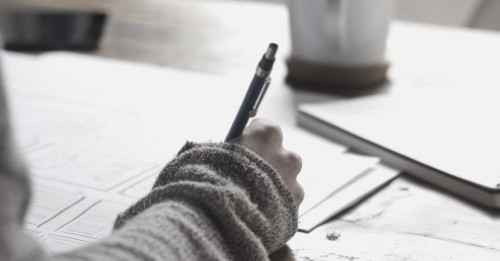Strengthen Self-Observation with this Journaling Practice

By Joy Reichart, New Ventures West, guest contributor
An effective use of the mind
Part of what makes the Integral Coaching methodology effective is its focus on somatics: awareness of what is happening in the body, and physical practices that support clients in building the body of someone who has the qualities or competencies they wish to develop (e.g., receptivity, relationality, humility, power, etc.)
In part we pay so much attention to the body because of the automatic and over-developed nature of cognition in this day and age. There is a wealth of wisdom in the body that, once they become aware of it, can be revolutionary for clients.
That said, we have not discounted the mind entirely—for one thing, that would not be very Integral of us! Self-observation is a central and effective practice in Integral Coaching: one that employs our powers of connection, pattern recognition, sense-making, and all of those other wonderful qualities of the mind. It is a way of getting clear on what our patterns are so that we can begin to shift them (the logic being, of course, that we can’t change something we don’t know about).
Typically a self-observation exercise consists of a question or a series of questions around a focus topic. The client is invited to reflect and journal answers to these questions a few times a day.
A client example
Let’s say Jane’s coaching program is about developing a more robust presence in the world. One thing she is challenged by in her daily life is having her voice heard in meetings. She struggles with interrupting, rarely finds openings in which to contribute her thoughts, and will sometimes get talked over when she starts to speak.
The self-observation exercise for Jane might be something like:
Please stop three times per day to reflect on the following questions. Please make notes so that you can begin to recognize patterns.
During this period of time:
- When did I feel held back from speaking?
- What were the circumstances?
- What was happening with my emotions? In my body?
- What did I ultimately do?
- Based on what I learned, what will I take into the next period of observation?
Notice that there is an opportunity to explore different behavior embedded right in the exercise. Granted, the change will not occur through insight alone—that rarely happens, if ever. Still, it gives Jane a way to get very clear on what is happening in moments that otherwise may simply feel confusing and overwhelming. It also affords a particular awareness around an automatic behavior, which in itself can go a long way toward shifting it.
This is an observation in one area of an Integral program that takes Jane’s whole life into account, but as it is such a consistent and emblematic occurrence, studying it can be particularly supportive to her growth.
Other elements of the coaching program will no doubt include a somatic practice like kickboxing, yoga warrior poses, or voice lessons. Perhaps her coach will ask her to read a book like Difficult Conversations or Leadership Embodiment that offer new ways of being in interactions. As she engages with these other practices, what she observes about herself in this specific scenario may also begin to evolve.
A practice for you
Since self-observations tend to work with our blind spots, it can be a more effective exercise when done as part of a coaching program, where the coach crafts the questions that invite the client to what may exist outside their structure of interpretation. That said, we can certainly take up a more rigorous study of ourselves any time, wherever we feel stuck. Here’s one way to start.
Think of a habit or behavior you wish to change: lateness, overeating, interrupting, avoiding a particular task, saying “yes” too often, finding yourself in the same circular conversation… anything that is consistently ‘up’ for you.
Then, very simply, do what Jane’s coach has invited her to do.
Set an alarm to go off three times per day: perhaps at lunchtime, in the evening, and before bed.* At those times, take five minutes to reflect on the following. You may wish to make notes so you can start to track patterns.
In this period of time:
- When did this behavior arise?
- What were the circumstances? (Where, when, who, etc.?)
- What were my emotions? What were the feelings in my body?
- What did I do?
- What might I do differently in the next period of time based on what I learned?
Notice what begins to evolve as a result of engaging in this exercise. You might also reflect on what somatic practices may support you in developing a new behavior. Maybe ask friends and colleagues for recommendations for books and other resources that may speak to this issue—or simply to support you in the exploration itself.
*If this is too much at first, you can simply do this once before bed, reflecting back on the entirety of your day.
Learn more about crafting powerful self-observations in Foundations of Coaching, a one- and two-half-day virtual class designed to give you skills like these that you can begin using right away in your work with others.
Joy Reichart is the Communications Director at New Ventures West in San Francisco.
Click here to sign up for our newsletter to stay up to date, get special offers, curated articles, free videos & more.

0 comments
Leave a comment